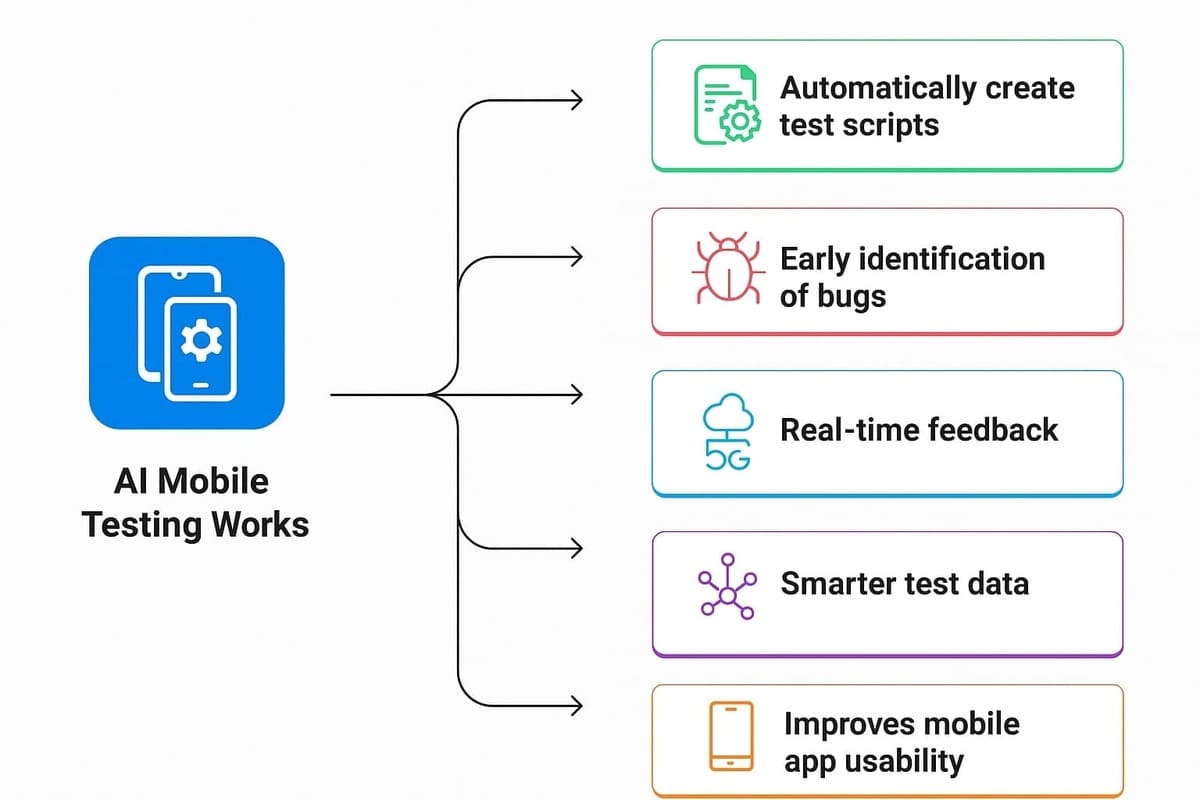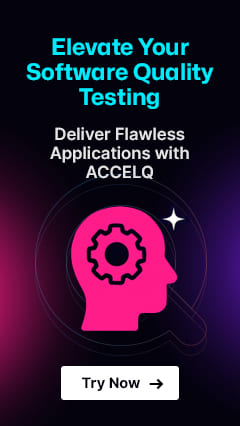The Complete Guide To AI Mobile Testing

AI mobile testing uses artificial intelligence (AI) technologies, including machine learning (ML) and natural language processing (NLP), to improve and automate various aspects of the mobile testing lifecycle. It transcends predetermined scripts that follow rigid procedures. Mobile app development continues to grow, so automated testing plays a major role in ensuring that applications meet the highest standards of quality. As the complexity of mobile apps increases, the traditional testing methods are no longer sufficient. Here is where AI-powered automation comes into play, revolutionizing the way we approach mobile testing.
AI for mobile app testing is revolutionizing the industry by enabling AI-driven testing platforms to generate test cases, create scripts, and analyze results. These platforms prioritize critical tests, improve test coverage, and eliminate redundant instances. This transformation represents a shift from a reactive to a proactive testing approach that can adapt to the evolving mobile landscape.
How does AI mobile testing work?

1. Automatically create test scripts
One of the most useful benefits of AI in mobile testing is that it can automatically write test scripts. These scripts are based on new features added to the mobile app, updates in functionality, or specific user requirements.
Here’s how the AI mobile app testing process usually works:
- First, you should explain what the mobile app should do. For instance, “Add an item to the cart” or “Do a payment.”
- Then you can feed these requirements to the AI model.
- The AI reads and understands your needs and begins to generate test cases.
- Next, you can review these AI-generated test cases and give feedback.
The above process continues until the AI delivers test cases that fully match your needs. Through this testing process, you can save a lot of time and effort, especially when apps are updated frequently.
2. Early identification of bugs
AI can also predict where bugs might appear, even before they happen. By analyzing old testing data, AI spots patterns and finds risky portions of the app that need more attention. Here’s how it works:
- The AI reviews previous testing results and looks at what failed, where, and why.
- AI then uses that information to understand what issues to expect in future versions of the mobile app.
- After being trained properly, the AI can analyze new app versions and alert about potential bugs.
3. Real-time feedback
Instead of waiting until the end of testing, tools give you updates as tests run. It means you can fix issues before and prevent long delays. To use AI: Pick an AI tool that meets your needs. Add it to your testing system. Run your tests, and the tool will track results instantly. You’ll get detailed insights like which tests are flaky, how many failed, and where to focus next. AI helps your team to deploy faster and make better decisions.
4. Smarter test data
You do not need a large amount of real user data. AI can create smart, false data that behaves like real user data. It can also hide sensitive data to ensure privacy while testing. AI test data helps in:
- Producing both successful and failing test scenarios that resemble real-life situations.
- Creating new data on the fly rather than storing large datasets.
- Reducing the need to write or collect test data manually.
5. Improves mobile app usability
AI testing tools can look into how people use your app and find areas where users might struggle. These tools give feedback to your team to improve the design and user experience. Here’s what to do:
- Choose an AI testing tool that includes usability tracking.
- Add it to your mobile app testing process.
- Use the insights to examine and fix any issues that could affect the user journey.
🚀 Take Your AI Knowledge Further
See how AI is reshaping software testing at scale. Get the Role of AI in Testing Whitepaper and discover proven insights you can apply today.
Role of machine learning in mobile testing
ML is like teaching kids to recognize fruits. You do not give them a list of rules. You just show them bananas, apples, and oranges. Pretty soon, they can tell them apart! ML is like that, but with computers learning from the information given to them. An ML model is a set of mathematical patterns or rules that the computer creates to make decisions or predictions. Let us look into how ML models enhance testing efficiency:
- ML helps in predictive analysis. This technology helps an application to process a massive amount of data and derive quantitative predictions that are customizable based on the user’s requirements.
- Character recognition and NLP, combined with predictive analysis, will help to create applications that can read and understand language. It is a milestone in ML-based mobile apps, and it helps to produce a range of applications for different niches.
- By analyzing historical testing data, ML models can predict possible defects and areas for improvement. This approach allows QA teams to address issues before they impact users, improving the overall reliability of the mobile app.
- ML models can find issues that may go unnoticed with traditional testing approaches or can be detected later in the lifecycle.
- Performance testing ensures that mobile apps can handle users demands across diverse network conditions and device specifications. At ACCELQ, we’ve embraced test optimization to deliver performance testing beyond traditional metrics.
Benefits of AI in mobile testing
- AI automation reduces tiring human tasks, leading to better and more uniform results for assessing your mobile app quality.
- The adoption of self-healing scripts as an AI-enabled feature helps trial systems adjust quickly to UI changes through automated processes. It reduces maintenance time for automated test suite management.
- AI can simulate user interactions and provide accurate test results to enhance test coverage and reduce manual effort.
- Using AI accelerates mobile testing, enabling faster bug detection and resolution. So, reduces the testing time, results in faster release cycles, and improves time-to-market.
- Through test result analysis and application code pattern studies, AI system monitoring finds potential defect zones to support regular performance testing services.
AI Tools and Automation
Let us explore some AI tools with features. And how these tools integrate into testing workflows and the advantages they bring over traditional methods.
AI tools for mobile testing
1) ACCELQ – It is an AI-powered codeless test automation platform that seamlessly automates web UI, API, mobile, and desktop testing without requiring any programming skills. It is the only true codeless mobile testing platform in the cloud that automates and executes tests across mobile OS and devices. The platform integrates automation with manual testing processes, making it possible for Agile teams to manage the QA lifecycle effectively.
Features:
- Zero-setup, cloud-native codeless automation for real devices and browser apps on iOS and Android.
- Offers a relatively low learning curve due to its codeless automation and user-friendly interface, allowing manual testers to automate testing without coding.
- Portable element design allows you to run tests on both iOS and Android, enabling team collaboration on test automation.
- Extends a codeless approach to full-blown Mobile-API-Web and manual testing in a single seamless unified flow.
- Intelligent test impact analysis to help reduce automation brittleness and maintenance overhead with advanced enterprise capabilities.
📖 Go Beyond Features: See ACCELQ in Action
Discover how Agile teams leverage codeless automation to deliver faster, smarter, and more reliable releases.
👉 Read: How to Succeed with In-Sprint Automation
2) Kane AI – It is a generative AI mobile testing agent that allows users to create, debug, and evolve tests using natural language.
Features:
- Intelligent test planner automatically generates and automates test steps from high-level objectives.
- 2-Way test editing to sync changes between natural language and your code edits.
- Auto bug detection during test execution to resolve them.
3) Katalon – It is a test automation solution that provides a platform to test mobile applications.
Features:
- Intelligent object recognition detects UI elements across several devices and screen sizes, ensuring that testing results are constant.
- Automated maintenance to detect changes in the mobile application and update test scripts accordingly to reduce the effort required to maintain test cases.
AI Mobile Test Automation
Testers can integrate AI-driven test automation tools into testing workflows in the following ways:
- Self-Healing Test Automation: AI automatically recognizes changed locators on the DOM and updates the test to avoid failures. If timing causes failures, it also adjusts wait times automatically. When elements change, AI automatically adjusts the tests based on the modified setup and continues with the tests. This self-healing mechanism is what is driving the AI testing adoption at such a scale.
- Test Orchestration: An AI-native test orchestration platform can actively optimize tests based on previous user interactions and test executions.
- Integration: You can test in isolation. But to achieve seamless integration across ecosystems, testing platforms need standardized communication protocols. AI testing tools use Model Control Protocols (MCP) to communicate with the platforms through standardized interfaces, eliminating custom integrations. Think of MCP as a “USB-C for AI integrations,” allowing AI assistants to connect with different software tools through a standardized interface.
Advantages Over Traditional Methods:
An AI testing tool can create test scripts using visual models, automatically adapt to application changes, find potential defects, and automate complex tasks to improve test efficiency and coverage. Below are a few reasons why you should implement AI in testing:
- With AI, you can schedule daily or weekly builds or integrate it with your CI system.
- AI detects and flags inconsistent tests by analyzing patterns, helping teams focus only on valid failures.
- Artificial intelligence prioritizes test cases based on recent code changes, risk impact, and defects to speed up feedback for high-priority features.
- AI performs visual regression testing and finds layout or design anomalies that traditional test scripts may overlook.
- AI uses historical data to forecast areas most likely to fail for preventive action before deployment.
- AI automatically detects compatibility issues across different environments to ensure consistent user experiences.
- AI-powered analytics gives actionable insights, summarizing root causes, trends, and optimization areas without manual effort.
Challenges of implementing AI in mobile app testing
- Learning Curve: Implementing AI mobile app testing requires skill and knowledge. Teams must know how AI algorithms operate, how to train models, and how to evaluate test results. The initial learning curve might be high, so there is an investment in training and skill development for the team.
- Implementation Cost: AI mobile testing tools implementation can be expensive, mainly for small organizations. It would be a strain on the budget to apply testing tools and infrastructure powered by AI.
- Tools Integration: Integrating AI tools into present testing frameworks and DevOps pipelines might be difficult due to compatibility challenges, data transfer complications, and workflow disruptions.
- Lacks Context: AI can struggle to comprehend the context of human language and behavior. While AI is good at many tasks, it lacks the contextual sensitivity for the intuition that naturally comes to humans. Thus, it leaves gaps in testing and oversight of important information.
- Security: Mobile testing using AI frequently requires enormous volumes of data to function properly and ensure the privacy of sensitive data. To guard user information, organizations must establish strong data security procedures and follow applicable rules.
Conclusion
AI mobile testing is changing the quality, efficiency, and scalability of mobile applications. Tester and developers can use powerful AI tools to automate tedious processes, forecast future issues, and ensure more comprehensive test coverage across several devices. As mobile testing evolves, integrating AI strengths with skilled human oversight will be critical in maintaining high app quality and user experience levels. ACCELQ Autopilot, an AI-driven test automation platform, ensures a balance between AI-driven efficiency and human oversight, enhancing mobile app quality.
You Might Also Like:
 What Is Mainframe Testing?
What Is Mainframe Testing?
What Is Mainframe Testing?
 Using ACCELQ to handle Salesforce Test Automation challenges.
Using ACCELQ to handle Salesforce Test Automation challenges.
Using ACCELQ to handle Salesforce Test Automation challenges.
 Transform SAP Testing: How ACCELQ Delivers Speed & Accuracy
Transform SAP Testing: How ACCELQ Delivers Speed & Accuracy



































